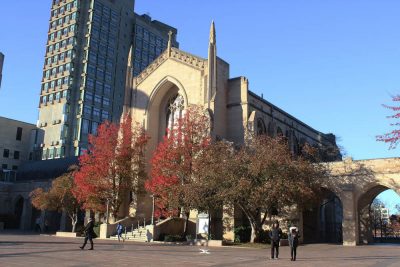
After more than three years of work, Boston University is getting ready to launch a university-wide general education program, known as the BU Hub, to promote cross-college engagement and prepare students for their professional and personal lives after college.
University Provost Jean Morrison said the program will be a university requirement for all students who matriculate in or after the fall of 2018.
While some individual colleges currently have general education requirements for their students, BU has never had a university-wide program like the BU Hub, said Bruce Schulman, a BU history professor and co-chair of the program’s implementation team.
Schulman said the committee that created the program includes faculty from across the university and consulted with students, student groups, alumni, parents, education experts and representatives from other universities who already have programs like the BU Hub.
“We … tried to take all that information and imagination,” Schulman said. “We saw as the essential things the basic knowledge skills and habits of mind we thought all our students ought to have and all the capacities that they should all develop.”
The program will also feature a new four-credit elective course called the Cross-College Challenge, which will involve teams of students working together to solve an issue for a university-wide initiative, such as Sustainability@BU, or for a local organization or group in Boston, like a museum or hospital.
The Cross-College Challenge was created after conversations with many students, parents, alumni and employers. The students expressed a strong desire to work on projects alongside students in other BU colleges.
“From students, one of the things we heard over and over again … was the desire to meet and get to know … to work with, [and] to have experiences with students in schools and colleges outside their own,” Schulman said.
Parents, alumni and employers stressed the necessity for students to enter the workforce knowing how to work in teams of people with different skills, cultural backgrounds, mindsets and talents, Schulman said.
“Being able to work in those kinds of groups is sort of an essential feature of 21st century life,” Schulman said.
The course, which will be offered to juniors and seniors, will begin a pilot stage in the summer and fall of 2018. Students can sign up for the course through a form on BU Hub’s website, which will pre-register them for the course.
Several students said they were intrigued by the idea of a collaborative group project that has the potential to involve organizations outside of BU, including Carly Baracco, a junior in the College of Engineering.
“In my experience, I haven’t gotten to talk to a lot of people from other colleges unless I do outside activities,” Baracco said, “… My classes are very much very specific to STEM fields … so it sounds like it would be a nice way [to also get to] know people from Questrom or people from CAS.”
Ruben Quinteros, a senior in the College of Communication, said he thinks the program will be useful in that it will allow students to make connections within both BU and the city at large.
“It sounds really helpful for students because it’s going to make them go out and explore things they maybe wouldn’t go to,” Quinteros said.
Schulman said all projects this summer will be focused on sustainability efforts and will only consist of one section of 25 students, but the fall course will have six sections, and will allow students to work with any one of a dozen sponsors.
While the course will not meet like a conventional class, Schulman said, there will be a designated time and space allocated to the sections to allow students and faculty a consistent time and place to meet and work on their projects.
“We’re piloting it mainly because we’re really excited about the idea and we think it could be a great program,” Schulman said, “… It could be a really valuable experience and make valuable connections for students and they could actually do some really good work. But beyond that we’re piloting it just so we can collect a lot of information.”
While the course has a current structure in place, Morrison said students will take on the course with the understanding that it is still in its pilot stages.
“We’ve got to see how it turns out and we want to use the experience to learn what works and what doesn’t,” Morrison said.
Both Schulman and Morrison said faculty and students will be repeatedly encouraged to provide feedback during and after the course.
CORRECTION: A previous version of this article included a sentence that said students had expressed interest in collaborating with students at other institutions. The sentence has been changed. Students had in fact expressed interest in collaborating with students in BU colleges other than their own.


















































































































